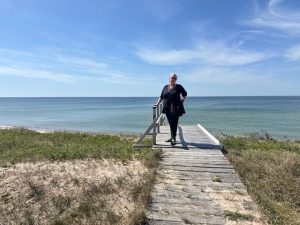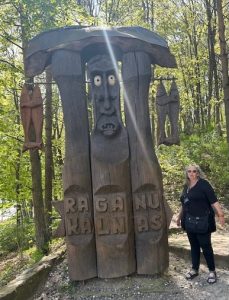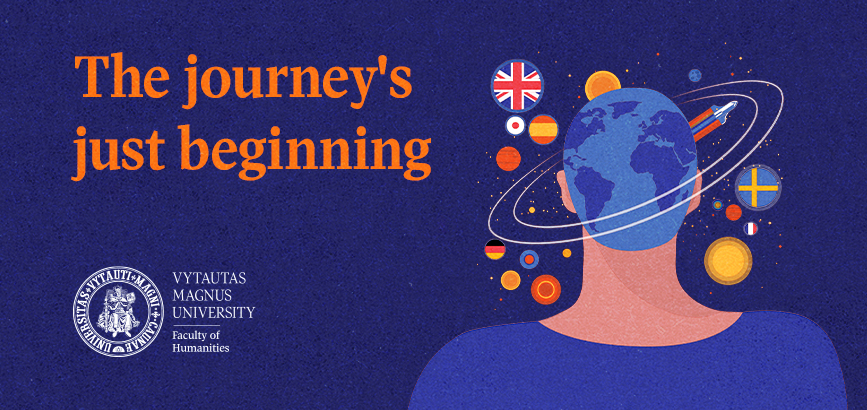Interview with Dr. Angela D. Arndt about the specific qualities of Lithuanian, the character of Lithuanians and her experience at VMU organizing a Lithuanian language and culture course
Dr. Angela E. Arndt was born in Detroit, Michigan, and now she lives in a little town called Rising Sun, Indiana, which is in the middle of the US. Her field of work is educational research to increase diversity in STEM engineering– Angela is a program evaluator who works with National Science Foundation grants; she also teaches technology to older adults; and works with a tech startup which offers online courses for adult learners. Being as included in education as she is, it’s no surprise that Angela decided to learn Lithuanian. But that’s not the main reason – descended from Lithuanian heritage, Angela has a strong desire to connect with her roots and immerse herself in Lithuanian culture. This spring, Angela came to Lithuania for the first time in her life and she agreed to share her experiences learning the language and exploring the country.
 Angela, have you always known that you’re of Lithuanian descent? Was that something that you talked about in your household when you were little?
Angela, have you always known that you’re of Lithuanian descent? Was that something that you talked about in your household when you were little?
I knew ever since I was little that my family was Lithuanian. They came to the USA in the 1950s and all of my family spoke Lithuanian. So I knew the fact that we were Lithuanian and the cultural aspects, the food and the occasions, but I didn’t learn the language. My mom was a bit of a rebel. My mother married and had us kids, and then divorced in the 1970s, and it was during the hippie era. So she went in the rebellious way, and she would speak with her family in Lithuanian, but she didn’t teach us. But we had exposure through my grandparents and aunts and uncles. And when I was a child, my grandparents would take me to mass when I’d stay over. It was all in Lithuanian, and so I would hear it. It was very melodic and beautiful and even mysterious because the words were different than if you know the meaning of the word. It was just the process of the ritual, the ritual of mass mixed with the language – it was magical to me.
Given the smaller Lithuanian population in Indiana, are there any Lithuanian communities there?
There are none. There’s one in the next big town, Cincinnati. But I have not connected with them, really, partially because I live in the country, too. But I found these online Lithuanian classes, and I was thrilled they had scholarships, so I took the opportunity.
 Why did you decide to learn Lithuanian? Was it because of your family, or was there some other reason?
Why did you decide to learn Lithuanian? Was it because of your family, or was there some other reason?
I wanted to learn. And also because of my mom. When she passed, I thought, I want to learn more, and enjoy it, and find some of that history. So that’s why I did it. The cultural part, too. The language itself is a big part of it, but unfortunately, my family members who spoke Lithuanian aren’t here anymore. So, it’s more about learning the culture and connecting with that heritage.
Do you think it’s a hard language to learn, have you faced any difficulties?
It is very challenging. I say this with humor, because it was so frustrating. I was 55 or 57 at the time I started learning. I could remember nursery rhymes, or how to ask for food, or understand “to sit down”, or “come here”, or “hello, goodbye”, that kind of stuff. But when I took the class… My confession to you is I’ve taken A1 four times, and I could take it again, but I only cried twice the first time.
I thought, how hard can it be, a beginner class, right? And the teacher gave me this chart, and I’m like, what is this? And they would say, okay, you do this to this word, and this word, and that word, and then this rule, and that. I was overwhelmed at first, it’s an incredibly challenging language. But it’s also fascinating. It’s a fascinating language for a lot of reasons.
One, I have it in my heart because of my family, but the more I’ve learned about it the deeper it seemed. In the beginning of the first online class, there were a good number of people there. And there was a group of Indian people. There were maybe five or six, and they were studying Lithuanian because of its connections to Sanskrit. They wanted to be able to understand Sanskrit because they were scholars and spiritual people who wanted to be able to read those texts. I had no idea. I knew it was an old language, I knew it was very valuable, but here in this group of mostly Lithuanians from around the world, but primarily the U.S., and then this group of Indian people, I was so surprised, and it added to the richness of the experience to me. It gave it more texture, more depth. It’s not just the people looking to seek out their roots, but it was another whole dimension of learning that these other people were interested in
 Do you have a favorite Lithuanian word or phrase?
Do you have a favorite Lithuanian word or phrase?
I don’t know about my favorite, but I use it a lot. I go “labai labai gerai”. I say that one a lot, because it rhymes, and I can say that one. And I can sing nursery rhymes that give me comfort from my family, and, of course, “aš noriu valgyt”. I love the sound of the language, it sounds like singing.
And the thing I really like, too, is speaking in English with people with an accent. Some of these folks will sound like my grandma or they’ll sound like my teta or they’ll sound like the conversations that I heard as a child when they would speak in Lithuanian, but they’d also speak in their English with a thick Lithuanian accent. And I hear that here. And in the classes, I heard that a lot, too, from the teachers and the scholars, because the cultural classes are in English. So that was a nice connection for me. That felt really good.
Now that it’s your first time in Lithuania, what’s the first impression, the first thought that you had?
It’s very special to be here in that it’s happening. I’ve wanted this for a long time. And to be in this place is incredibly special. And at the same time, it’s very comfortable. I feel safe. I feel welcomed. I’ve had a lovely trip so far. I have more of a lovely trip planned. And it’s so beautiful. It’s such a beautiful, green place. And the history is complicated and deep and conflicting. And even though there’s nothing simple about the history, I feel comfortable here.
Have you heard any stereotypes before coming here about Lithuania?
As a stereotype, there are people that would say, oh, they’re closed. And I’ve seen some people walking around. They don’t make eye contact. They’re not smiling. You know, very few people are actually.
But I know that people here have experienced trauma (I’m talking about Soviet occupation) and then these people had children. And young people didn’t experience that trauma, but they learn characteristics from the generation before. So, you know, the children may not smile. Although the few young people I’ve actually had any interaction with have been very social.
And sometimes I think, you know, from a deeper psychological perspective, if you spend some time working on yourself and understanding human development and behaviour, it’s as if it’s not about me that they’re looking so crabby. Maybe they have their whole other thing going on. It’s just their face most of the time. It’s not me. We were walking by the bar the other night and I looked in and everybody’s partying and they’re young people and they’re having a good time.
What differences do you see between Lithuania and the USA?
I had several people say, why are you going to Europe? Why are you going to Lithuania? Why don’t you go to California or the Grand Canyon?
I haven’t gone to all the places in America. Why did I go to Europe? Well, it’s a different culture. It’s a different value system. It’s a different experience altogether.
I would hope that the value that you find in your uniqueness, you love that and cultivate it. And America is not better.
What would you tell someone who is thinking about learning Lithuanian, or coming to visit Lithuania, but is not ready yet, is still debating?
I would tell them it’s easier than you think, particularly to get here, and to manage. And as far as the language goes, it is not a piece of cake. The language is not simple, but it’s something to belong to. So just go for it – even if it takes 4 times of A1, as it did for me, it’s an incredible experience, just don’t be afraid to jump in.












